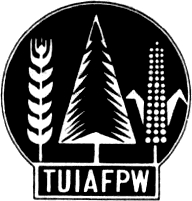
Syndicalism is a revolutionary current within the labour movement that, through industrial unionism, seeks to unionize workers according to industry and advance their demands through strikes, with the eventual goal of gaining control over the means of production and the economy at large through social ownership. Developed in French labor unions during the late 19th century, syndicalist movements were most predominant amongst the socialist movement during the interwar period that preceded the outbreak of World War II.

The World Federation of Trade Unions (WFTU) is an international federation of trade unions established in 1945. Founded in the immediate aftermath of World War Two, the organization built on the pre-war legacy of the International Federation of Trade Unions as a single structure for trade unions world-wide, following the World Trade Union Conference in London, United Kingdom.
The International Workers' Association – Asociación Internacional de los Trabajadores (IWA–AIT) is an international federation of anarcho-syndicalist labor unions and initiatives.

The General Confederation of Labour is a Spanish trade union federation. Formed as a faction of the National Confederation of Labour (CNT) during the Spanish transition to democracy, its support for participation in union elections led it to split from the organisation, which prohibited participation. After losing a lengthy legal battle for the name, the pro-electoral faction renamed itself to the CGT and reorganised itself as an independent trade union center.
The Unión General de Trabajadores is a major Spanish trade union, historically affiliated with the Spanish Socialist Workers' Party (PSOE).
General Confederation of Labour can mean one of the following labor unions:

The Central Organisation of Swedish Workers is a Swedish syndicalist trade union federation. The SAC organises people from all occupations and industries in one single federation, including the unemployed, students, and the retired. The SAC also publishes the weekly newspaper Arbetaren, owns the publishing house Federativ and runs the unemployment fund Sveriges Arbetares Arbetslöshetskassa (SAAK).

The First International Syndicalist Congress was a meeting of European and Latin American syndicalist organizations at Holborn Town Hall in London from September 27 to October 2, 1913. Upon a proposal by the Dutch National Labor Secretariat (NAS) and the British Industrial Syndicalist Education League (ISEL), most European syndicalist groups, both trade unions and advocacy groups, agreed to congregate at a meeting in London. The only exception was the biggest syndicalist organization worldwide, the French General Confederation of Labor (CGT). Nevertheless, the congress was held with organizations from twelve countries participating. It was marked by heated debate and constant disagreements over both tactics and principles. Yet, it succeeded in creating the International Syndicalist Information Bureau as a vehicle of exchange and solidarity between the various organizations and the Bulletin international du mouvement syndicaliste as a means of communication. It would be viewed as a success by almost all who participated.
Agrupación de Trabajadores Latinoamericanos Sindicalistas or ATLAS was a Latin American trade union confederation in the early 1950s.

José Alonso was an Argentine politician and trade unionist.

The ICFTU Inter American Regional Organisation of Workers was the regional organization of the International Confederation of Free Trade Unions (ICFTU) for the Americas.

Pierre Besnard was a French anarcho-syndicalist. He was the co-founder and leader of the Confédération Générale du Travail-Syndicaliste Révolutionnaire (CGT-SR) and its successor the Confédération Nationale du Travail (CNT), and the principal theoretician of anarcho-syndicalism in France during the early 20th century.
Disunited and poorly organized for most of its history, trade unions in Ecuador developed only slowly and had only a marginal political impact. Precise figures on unionization in the late 1980s were practically nonexistent, even within the unions themselves. The organized labor movement in Ecuador was divided into four confederations and a number of independent federations. At the local level, labor organizations also took the form of artisan guilds, cooperatives, and neighborhood associations. In addition to representing only a minority of the workers in all sectors of employment, the labor movement traditionally was weakened by rivalry and government repression. Nevertheless, it had influence disproportionate to its numbers as a result of the concentration of trade unions in urban areas, mainly Quito and Guayaquil, its organizational power, and the political impact of strikes and demonstrations on governments that did not enjoy strong support.

The International Federation of Trade Unions was an international organization of trade unions, existing between 1919 and 1945. IFTU had its roots in the pre-war IFTU.

The Trade Union International of Agricultural, Forestry and Plantation Workers was a trade union international affiliated with the World Federation of Trade Unions.
The history of anarcho-syndicalism dates back to the anti-authoritarian faction of the International Workingmen's Association. Revolutionary syndicalism as a tendency was constituted in the 1890s by the French General Confederation of Labour (CGT), which became a model union for other syndicalist organisations to base themselves on. Anarchists were involved in the syndicalist movement from the outset and a specific anarchist tendency developed within the movement over the subsequent decades.









